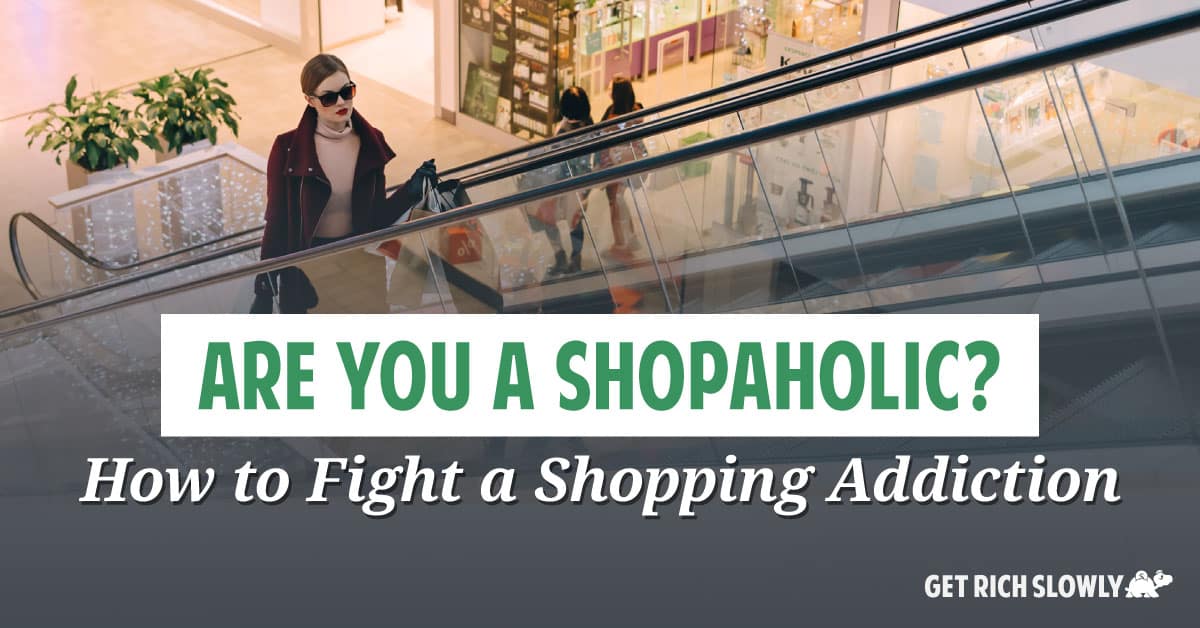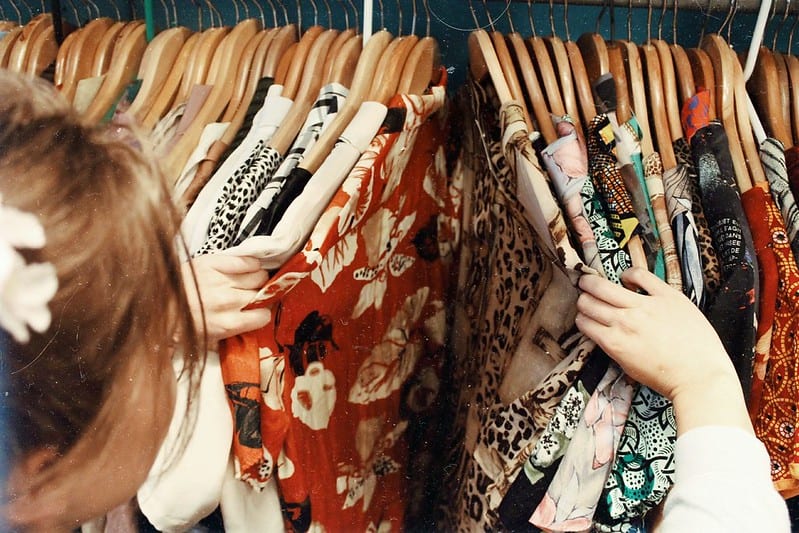Shopping addiction: How to stop being a shopaholic

Yesterday, I mentioned that because I grew up poor, I inherited a faulty money blueprint from my parents. They didn’t know how to handle money effectively, so they couldn’t teach me how to handle it effectively. I entered adulthood with many of the same bad habits they’d had when I was a kid.
I was a compulsive spender, for instance. I had a shopping addiction. I had no willpower, no impulse control. Even when I had no money in the bank, I still found ways to spend. I took on over $20,000 in credit card debt before I turned 25!
Nowadays, I mostly have my spending under control. I’m no longer in debt, and I force myself to make conscious decisions about what I purchase. (Conscious spending is one of the keys to overcoming emotional spending.)
Having said that, I know that if I relax for even a moment, I’ll be right back in my old habits. I’ll find myself at the grocery store buying magazines to soothe a bruised ego, or shopping for music in the iTunes store because I had a stressful day.
How do I know I’ll relapse if I’m not careful? Because I do from time to time. When I was prepping for my big talk at the end of June, for example, I felt super stressed and my shopping addiction kicked in. I spent an afternoon browsing on Amazon, putting things in my shopping basket. (I even ordered a few of the things, although I knew I shouldn’t.)
Emotional spending is comforting — not just for me, but for a lot of other people too. Though I’m a recovering spendaholic, I’m still a spendaholic. I’m always one step away from compulsive spending.
My story is not unique.
What Is a Shopping Addiction?
People who have a shopping addiction suffer from what’s known as “compulsive spending”. According to the Illinois Institute for Addiction Recovery:
“Compulsive shopping and spending is described as a pattern of chronic, repetitive purchasing that becomes difficult to stop and ultimately results in harmful consequences. It is defined as an impulse control disorder and has features similar to other addictive disorders without involving the use of an intoxicating drug.”
The organization offers the following list of warning signs of a shopping addiction:
- Shopping of spending money as a result of being disappointed, angry or scared.
- Shopping/spending habits causing emotional distress or chaos in one’s life.
- Having arguments with others regarding shopping or spending habits.
- Feeling lost without credit cards.
- Buying items on credit that would not be bought with cash.
- Spending money causes a rush of euphoria and anxiety at the same time.
- Spending or shopping feels like a reckless or forbidden act.
- Feeling guilty, ashamed, embarrassed or confused after shopping or spending money. Many purchases are never used.
- Lying to others about what was bought or how much money was spent.
- Thinking excessively about money.
- Spending a lot of time juggling accounts and bills to accommodate spending.
I’ve experienced all of these. In fact, I used to suffer from many of these at the same time. It felt awful. An addiction to spending is a scary, dangerous thing. As with other addictions, victims feel lost and out of control.
People who have never suffered from a shopping addiction can’t understand the problem, and you may have a hard time explaining it to them. They don’t know what it’s like to see something and feel the urge to buy it now. They don’t know the lure of the shopping “rush” — and the subsequent nausea from the guilt have having spent too much.
“Overspenders…have confused and confusing relationships with money,” write psychologists Brad and Ted Klontz in Mind Over Money. “On one hand, they’re convinced that money and the things it can buy will make them happy; yet they’re often broke because they can’t control their spending.”
Fortunately, I’ve learned some ways to cope with emotional spending. Though I’m still tempted, I don’t spend nearly as much as I used to because I’ve developed habits that help me do the right thing, even when the right thing is difficult.
How to Fight a Shopping Addiction
Based on my own experience — and based on conversations I’ve had with others — here are seven strategies you can use to fight a shopping addiction:
Cut up your credit cards
If you have a problem with compulsive spending, destroy your credit cards now. Don’t make excuses. Don’t jot the account numbers someplace “just in case”. Don’t rationalize that you need them to help your credit score. If credit cards fuel your emotional spending, you’re better off without them. (You can always get new cards once you’ve learned better habits.)
Carry cash only
Don’t use your checkbook or a debit card. Inconvenient? Absolutely, but that’s the point. If you’re a compulsive spender, your goal is to break the habit. To do this, you’ve got to make sacrifices. Spending cash is a way to remind yourself that you’re spending real money. Plastic (and to some degree checks) make this connection fuzzy.
Track every penny you spend
You may not even be aware of how much you’re spending. Back when I let my emotions rule my financial life, I had no idea how many books I was buying, for example. But once I started tracking every dollar that came into and went out of my life, patterns became clear. When you track every penny you spend, you can act on them.
Play mind games
For some people, money isn’t an emotional issue. They’re able to make logical choices and not be tempted to otherwise. They’re lucky. For most of us, however, it doesn’t work that way. If you’re in this majority, find ways to play tricks on yourself. You might train yourself to use the 30-day rule, for instance: When you see something you want, don’t buy it right away; instead, note it on your calendar for 30 days in the future. If you still want it in a month, consider buying it. I’ve found that I can keep myself from buying a lot of stuff by simply putting it on my Amazon wish list. I come back later and wonder why I was ever tempted!
Avoid temptation
The best way to keep from spending is to avoid situations that tempt you to spend in the first place. If your weakness is books, stay out of bookstores and avoid Amazon. If you tend to overspend at big department stores, stay away from the mall. Stop going to the places where you normally spend, especially if you’re under emotional stress.
Remind yourself of larger goals
I’ve struggled with my weight all my life. Whenever I’m tempted to eat something bad, I ask myself, “Will this help me or hurt me?” The same question can be asked when you’re about to make an impulse purchase. Will your new toy bring you closer to your goals or move you further away? (If you’re not clear on your larger goals, try drafting a personal mission statement.)
Ask for help
There’s no shame in asking for help if you’re having trouble with your spending. Talk to a close friend or family member, and ask for support in breaking the cycle of compulsive spending. You may even want to seek professional help. But remember: If you ask for help, don’t get angry when your counselors call you on your missteps. Listen to what they have to say.
Each of these techniques can help curb your shopping addiction to some degree. Different techniques will appeal to different people.
There’s one other strategy that I’ve found to be very effective for myself: When I find myself tempted to buy something, I force myself to stop for a moment and ask myself some serious questions.

What to Do When You’re Tempted to Buy
Let’s say you’re in the mall or at the Electronics Emporium. There’s nothing you need to buy, but you’re killing time while your spouse finishes an errand. As you wait, you browse. You admire the Thneeds. Look! There’s a new one! It’s bright and shiny and you think it will make you happy, so you pick it up, walk to the register to purchase it.
Wait! Before you buy, think about the following questions:
When will I use this?
When you buy compulsively, when you spend on impulse, you tend to acquire a lot of stuff you never use. Look around your home. Do you have unopened CDs or DVDs? Unread books? Unplayed videogames? Do you have clothes that still sport their price tags? Do you have a collection of “money-saving” gadgets gathering dust in your closets and kitchen drawers? Before you buy something new, ask yourself when you’ll actually use it — and be honest with yourself.
Do I have another one like this already?
If so, what’s wrong with the old one? I use this question in a variety of situations, especially when I’m tempted to buy clothes. Kim gets frustrated with my tendency to acquire new t-shirts, for example. “You already have five blue t-shirts,” she told me recently. “Why do you need another?” This is also a great question to ask when faced with the urge to upgrade. Do you really need to replace your iPhone?
If I buy this, where will I put it?
It’s surprising how often this question prevents me from buying something new. For the past few years, I’ve had limited space to store stuff. First, Kim and I were on the road in an RV with no storage. Next, we moved to a smaller house. If I force myself to think about where I’ll store whatever it is that tempts me, that’s often enough to make me decide not to buy it.
If I buy this, can I pay cash? Would I pay cash for this?
When I was in debt, I bought almost everything on credit. I figured I could pay for it later. All of my cash went to pay my credit card bills. I was dumb. I’ve since realized that if something isn’t worth saving for, if it’s not worth buying with cash, then it’s almost certainly not worth buying on credit.
Can I buy a good-quality used version for less?
I used to be a “new snob”. I believed that things were only worth buying if I could have them in new, pristine condition. Now I know that great deals can be had on gently used items. This is true of cars, of course, but it’s also true of games, electronics, clothing, and more. Make a habit of checking Craigslist first — and taking a look at your local thrift store.
Do I know anyone who already owns one I can borrow?
I overheard a story the other day. Evan was preparing for some yardwork and making an inventory of his tools. He decided he wanted a chainsaw. He called his friend Lee to ask for advice on which one to buy. “Why do you want to buy a chainsaw?” Lee asked. “Do you have a lot of trees to clear?” Evan admitted that he did not. “Then why don’t you just borrow mine?” Lee asked. When done respectfully, borrowing is a great alternative to buying new.
Can I wait to buy this?
One of the best things I’ve done to fight my shopping addiction is to teach myself to wait. For the past decade, I’ve used the afore-mentioned 30-day rule. When I find myself in the Electronics Emporium holding the latest game for the Nintendo Switch, I put it back and tell myself that I can buy it in 30 days if I still want it. The key is to make yourself wait to make a purchase, to not give in to your desire to buy in the moment.
Why do I want to buy this?
And why do I want to buy it today? It’s true that many times I’m inclined to buy something because it would fill a need in my life. But just as often I find myself wanting to buy things because I’ve recently seen an ad. Or, worse, a friend has shown me some cool new gadget. In these cases, I’m not filling an ongoing need; I’m simply trying to fill a sense of lack created by comparing myself with others. If I can figure out why I have the urge to buy something, I can sometimes make the urge go away.
Are there better options available?
This is a great question to trick myself into taking more time. If I find myself browsing Amazon tempted to buy a compound miter saw, for example, I can sometimes talk myself out of it by realizing that I have no idea whether this compound miter saw is the best model. Instead, I go research compound miter saws (or whatever) via Consumer Reports and online review sites. I try to find the best option. Most of the time, the process gets overwhelming: There are so many compound miter saws with so many different features! I lose interest and I save myself some money.
What would my partner say if I bought this?
Kim isn’t opposed to everything I buy, but she’s often able to detect compulsive spending when I cannot. Sometimes if I’m tempted buy a new toy, I try to put myself in her shoes, to view the purchase through her eyes. If, from her perspective, the purchase seems reasonable, then I consider it. But it looks foolish, I often change my mind.
I’ve used all of these questions to learn to control my shopping addiction. I don’t ask myself all of these questions every time I shop. Each is useful in certain situations. And these questions don’t stop all of my purchases. But I’ve found that if I give myself honest answers, they can prevent a lot of spending.
Additional Resources
For more information on coping with compulsive spending and shopping addiction, explore the following websites:
- Debtors Anonymous offers free support for people who wish to stop incurring debt.
- Indiana University: How can I manage compulsive shopping and spending addiction?
- MSNBC: How to escape a shopping addiction
- The Illinois Institute for Addiction Recovery at Proctor Hospital
- wikiHow: How to buy nothing
Finally, consider seeking professional help. There is no shame in obtaining psychotherapy for problems that seem bigger than you. Ultimately you must look inward to overcome any form of addiction — a therapist is like a trained guide who can help you find the way.
The good news is you can overcome this. You can break free from emotional spending. The bad news is that it takes work. It won’t happen overnight. You’ll make mistakes, and you’ll backslide. When you do, don’t give up. Don’t beat yourself up because you bought a new purse or played a round of golf at the new course. You’re human. Keep focused on your long-term goal, and resolve to do better next time.
Become A Money Boss And Join 15,000 Others
Subscribe to the GRS Insider (FREE) and we’ll give you a copy of the Money Boss Manifesto (also FREE)

